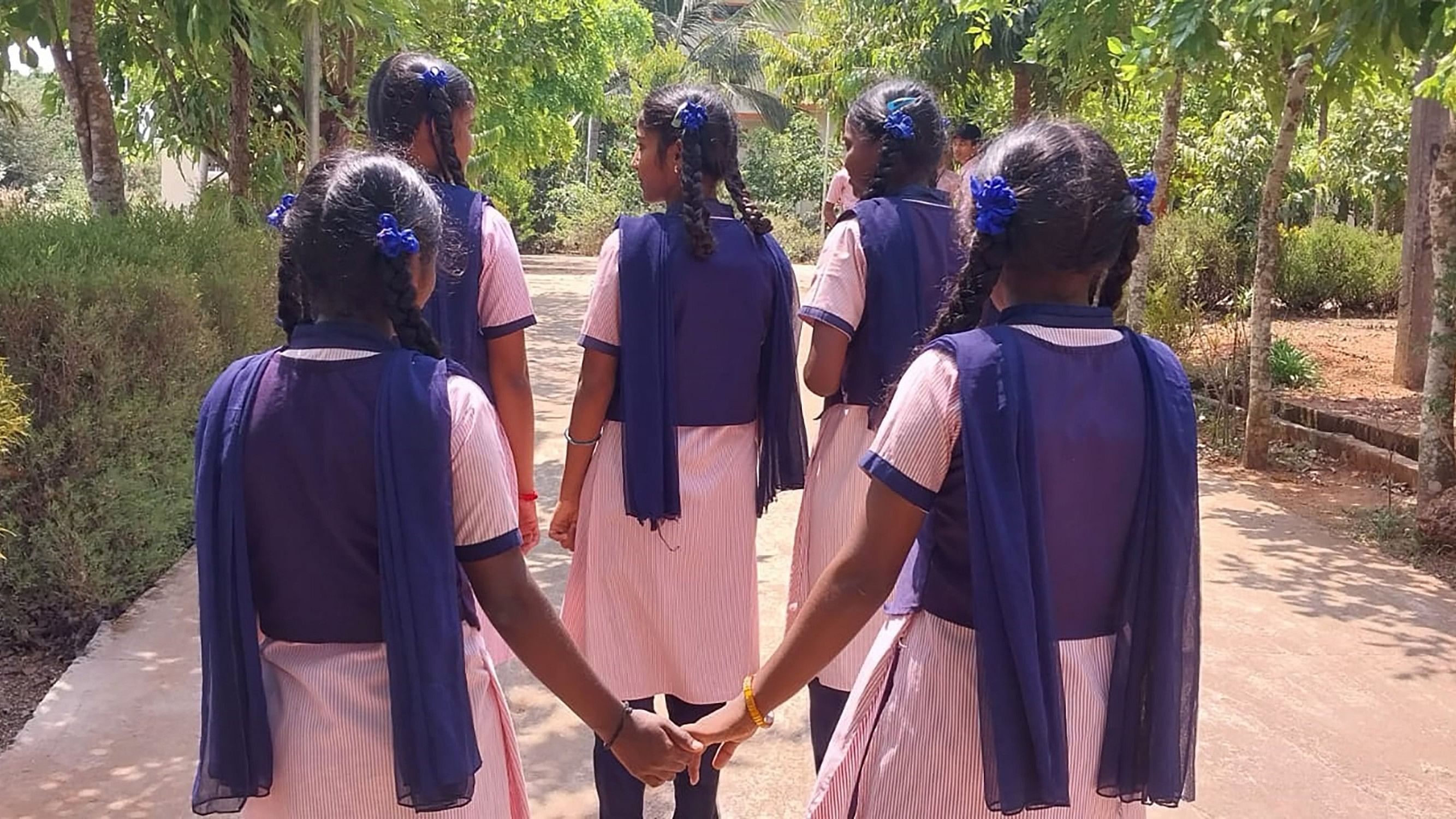
Students at a govt-run residential school.
Credit: DH Photo/Anitha Pailoor
In the last week of 2023, a 15-year-old student from a government-run residential school in North Karnataka gave birth to a child.
Neither the school authorities nor her parents were aware of her condition till she was seven months into pregnancy.
This lack of attention points to the potential flaws within systems developed to protect children.
During investigation, the girl was found to have conceived while at home during holidays. Her condition went unnoticed for seven months despite the school having a provision for a staff nurse.
The principal and the hostel warden (who was on deputation) have been suspended in connection with
the incident.
Female warden
The incident also highlights the need for a female warden to be assigned specifically to the girl’s hostel.
“We have requested the government to appoint a female warden and are waiting for their response,” the incharge principal says. Currently, a male teacher has been given the additional charge of warden for the boys’ and girls’ hostels and a woman housekeeping staff doubles as a caretaker in the girls’ hostel.
The teen mother says she did not realise she was pregnant and felt that it was a case of delayed menstruation, which is common in some of her hostel mates.
“We are provided with sanitary pads every month. Whether we use it or not, we need to collect them and sign on the register. I did not know if my condition was important enough to discuss or with whom I should share,” she says. The girl is studying for her class 10 exam and wants to pursue law.
Vacancies and unfilled positions resulting in grave situations are not limited to this school or incident.
Deaths of children
A report by The Legislature Committee on the Welfare of Scheduled Castes/Scheduled Tribes tabled in the Assembly in December 2023 mentions that 92 children have died in government-run residential schools in the past five years. Of them, 29 died by suicide.
Over the past three decades, the state government, through residential schools, has given a platform for children from marginalised and deprived communities to access education. However, various problems — from staff vacancy to poor infrastructure — impede their well-rounded growth.
Staff shortage
According to data provided by the social welfare department in the legislative council in February, 41% of warden posts have not been filled, 64.7% schools do not have a permanent staff nurse and 42.9% teaching posts are vacant. While guest teachers and nurses have been hired on contract basis, teachers take turns as wardens.
From record-keeping to hygiene, the schools have a long way to go in achieving their objectives, say parents whose children are studying in various residential schools.
Skin allergy has been a consistent health problem in many residential schools. Water scarcity, unhygienic conditions and inordinate delay in replenishing supplies
are some of the causes.
Rented spaces
While Morarji Desai schools are run from their own buildings in spacious campuses, many younger residential schools function from rented spaces.
Take the case of Dr B R Ambedkar Residential School, Uppinangady in Dakshina Kannada. Interestingly, the school is housed in a private hostel building in Puttur, which is 15 km away from Uppinangady.
Land has been allotted, but building construction has not started yet. The three-storey building has classes on the ground floor, a boys’ hostel on the first floor and girls’ hostel on the second floor. As there are no designated wardens, teachers take turns.
Last September, one student died and another was grievously injured when the wall of a concrete water tank collapsed at Morarji Desai School in Ramanagar district.
“It took months of follow-up to get the administration to pay my son’s hospital bills. After that no one has even bothered to check on him or has given any compensation,” says Ravindra S A, the father of the injured student.Though his son has returned to school after a two-month recovery period, Ravindra, who works as a carpenter, says that doctors have advised various restrictions including sports.
Dr K T Thippeswamy, member, Karnataka State Commission for Protection of Child Rights highlights the failure of the schools to adhere to child protection policy. The policy has made it mandatory for all educational institutions to create awareness about basic principles of safety. Teachers allege that the groceries supplied are generally of poor quality and different from the samples shown.
Decentralised system
Since this is supplied centrally, they do not have much say in this. Many principals feel that a decentralised system would help optimise their performance.
“We have to approach the Karnataka Residential Educational Institutions Society (KREIS) office in Bengaluru for every small decision. It would help if there is a decentralised system with a district office,” says a principal.
Good education
Despite the many hurdles they face, these schools have recorded excellent SSLC results. KREIS executive director Praveen P Bagewadi says, “The quality of education is good at KREIS institutions. There are certain loopholes and we will address them at the earliest. There are constraints — both monetary and executive — we will resolve them soon.”